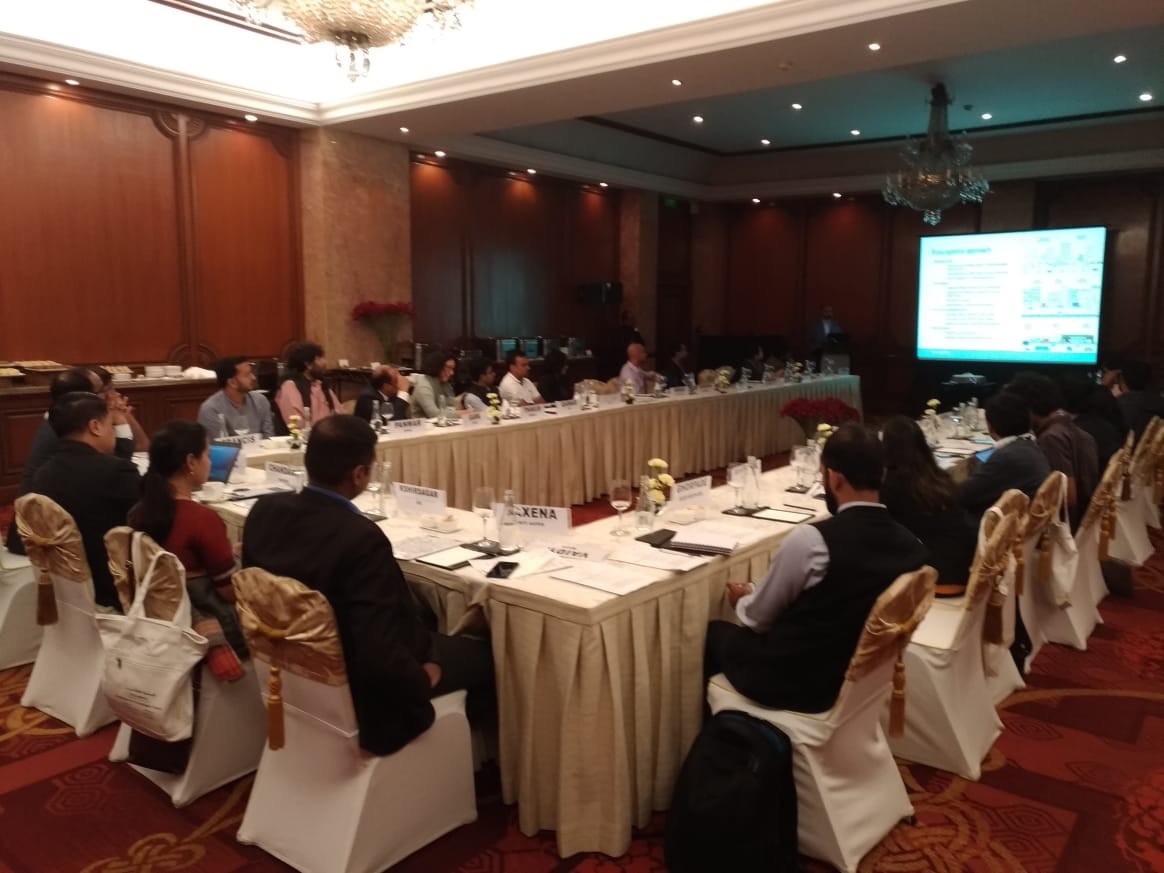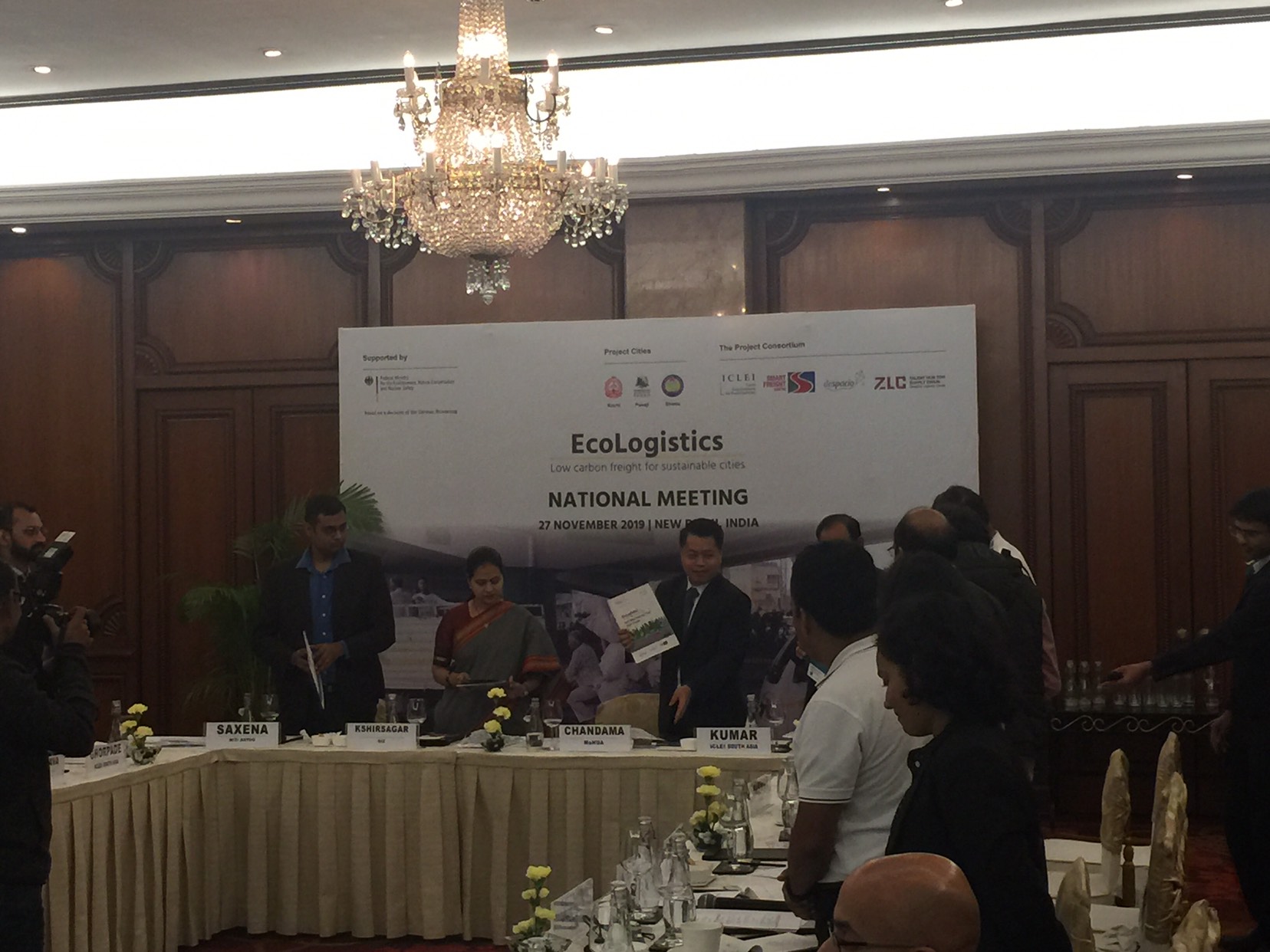This piece was originally published on ICLEI South Asia Secretariat’s website.
ICLEI South Asia organised the ‘National Meeting for EcoLogistics – Low Carbon Freight for Sustainable Cities’ on the 27th of November 2019 in New Delhi.
It was attended by representatives from the Ministry of Housing and Urban Affairs (MoHUA), Government of India; NITI Aayog; IKI; city governments; Smart Cities Mission Special Purpose Vehicles; private firms such as IKEA and logistics operators; IIT Delhi and School of Planning and Architecture (SPA), Delhi; and over 20 development organisations working on urban freight in India.
The purpose of the meeting was to discuss Low Carbon Urban Freight Action Plans for Indian cities, acknowledge the good initiatives in the sector, explore opportunities for collaboration between stakeholders (national and city governments, and private stakeholders) and to decide the future course of action to promote sustainable urban freight in Indian cities.
Mr. Emani Kumar, Executive Director, ICLEI South Asia, welcomed the participants and said that the EcoLogistics project aimed to prioritise strategies to promote transportation of goods with minimised impacts on air quality, noise, health, fatalities & injuries, traffic congestion and reduced GHG emissions.
A first-of-its-kind and a global initiative, the project will assist cities in developing low-carbon action plans for urban freight, support the implementation of demonstration projects in cities, and highlight national policy recommendations for the urban freight sector. The project is supported by the German Federal Ministry for the Environment, Nature Conservation, Building and Nuclear Safety (BMU) through its International Climate Initiative (IKI) programme. In India, the project is being implemented in the cities of Kochi, Shimla and Panaji.
Mr. Lal Chandama, Director, Smart Cities Mission , MoHUA, said in his keynote speech that urban freight provided immense potential to reduce emissions. He gave an overview of the climate-smart cities framework and recognised the opportunity to include urban freight in the Climate Assessment Framework of Government of India.
Mr. Abhishek Saxena, Young Professional, Development Evaluation Monitoring Organisation, NITI Aayog stated that urban freight was a major contributor to air pollution, which is a public health emergency. He welcomed the roundtable meeting on the EcoLogistics project, calling it a timely initiative and said that the discussions from the meeting should be relevant to the entire freight and logistics sector in India. He encouraged the project team to share the findings and outcomes of the meeting as it could help in initiating discussion on urban freight in India.
Ms. Meghna Kshirsagar technical advisor-Climate Change, GIZ highlighted the major projects and thematic areas of the International Climate Initiative (IKI) in India.
The inaugural session was followed by the launch of the ICLEI EcoLogistics Self-monitoring tool, which is a calculation tool that helps cities to estimate their greenhouse gas emissions from urban freight transport. It allows the assessment of baseline and target scenarios, wherein specific technologies or strategies are hypothetically implemented. The tool also acts as a monitoring tool for cities to make meaningful comparisons over time, and with other cities in terms of urban freight emissions.
The launch of the tool was followed by a presentation by ICLEI staff on the EcoLogistics project, its relevance, the activities planned in Indian cities, and good practices in sustainable urban freight management in European cities.
There were presentations by the project cities on the urban freight baseline to be developed as part of the EcoLogistics project. The representatives of city governments included Mr. KX Francis, Councillor, Kochi Municipal Corporation; Mr. Clive Paiva, Corporation of the City of Panaji and Nitin Garg, General Manager (Technical), Shimla Smart City Limited.
There were presentations by Dr. Abhijit Lokre, Founder, The Urban Lab; Dr Sandeep Gandhi, Principal Architect, SGArchitects; Sairam Dasari, Development Initiative, and Vikas Sethia, Founder, Delivery Optimisation Shared Transportation (DOST). In addition, Ms. Prathna Bohrah, India Director, Clean Air Asia, and a representative from IKEA India shared their views on green freight.
The presentations were followed by a roundtable discussion on “Bringing Focus on Sustainable Management of Freight in Indian Cities”. The roundtable, moderated by Prof. Sanjay Gupta, SPA, Delhi, focused on data gaps in urban freight, decarbonisation of urban freight and the role of the private sector in it; the relevance of economic principles in managing urban freight; and the potential for electric vehicles to make last-mile logistics more efficient.
The roundtable session was followed by detailed discussions on the framework for Low Carbon Urban Freight Action Plans for Kochi, Panaji and Shimla.




